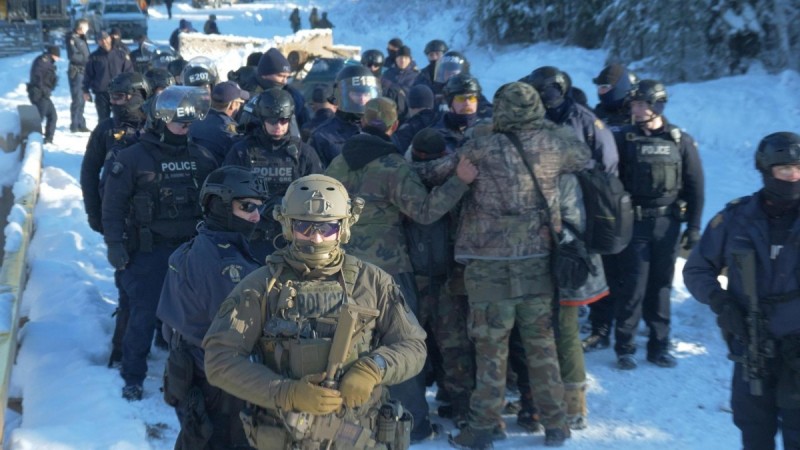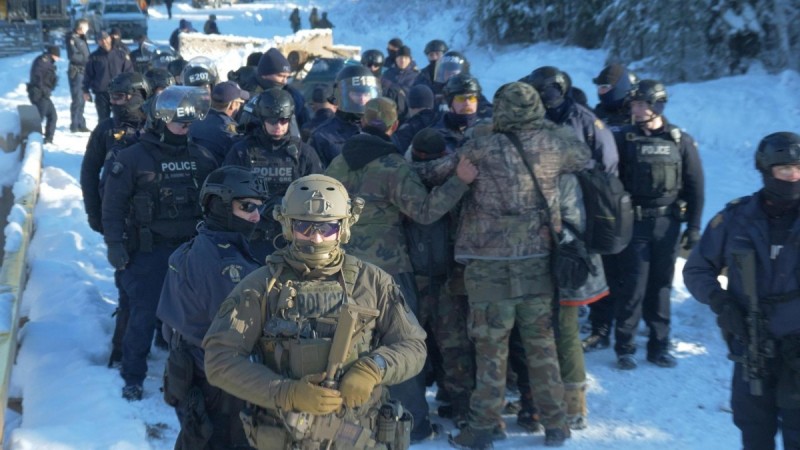What the Wet’suwet’en raid tells us about Canada’s ‘liberal democracy’

RCMP Emergency Response Team members stand watch during a raid on Wet’suwet’en territory in British Columbia, November 19, 2021. Photo courtesy Gidimt’en Checkpoint.
Canada, like most of the Western (wealthy) world, is a self-styled “liberal democracy,” broadly considered the gold standard in global development. Liberal democracies are founded on a commitment to universal human rights and freedoms, values codified in international law by post-war institutions like the United Nations. This universalization of liberalism over the 20th century is what led Francis Fukuyama to declare “the end of history.”
But in the last week in Canada, we have seen these liberal values rocked to their core.
Indigenous people have been violently removed from their lands. The state has used a militarized police force to facilitate land theft by a private corporation. Journalists have been tracked, arrested, and held for days. All for the purpose of building a new fossil gas pipeline in the middle of a climate emergency—an activity that a Dutch court has ruled itself violates human rights.
Amnesty International has repeatedly classified Canada’s actions on Wet’suwet’en territory as human rights violations. The UN Committee on the Elimination of Racial Discrimination has done the same and called on Canada to suspend work not only on the Coastal GasLink pipeline but also on the Trans Mountain expansion project and the Site C dam. And Canada is violating its own “rule of law,” by arresting and holding journalists, by establishing exclusion zones to prevent media access, and crucially, by failing to respect the inherent title the Wet’suwet’en hold to their land—title that has been recognized by Canadian jurisprudence.
The Coastal GasLink pipeline and the conflict on Wet’suwet’en territory represent just one of a number of ongoing human rights violations in Canada. These violations, in turn, are just the latest manifestations of a tradition of exploitation, expropriation, and genocide that dates back to the country’s origins.
This kind of record suggests that Canada’s commitment to the values of liberalism is based on a serious contradiction. And of course, if Canada is built on contradiction; so too are the United States, the United Kingdom, and every other imperial power or settler colonial nation state. Which leaves the world of liberalism with few, if any, genuine adherents.
So, is liberalism a myth? A good idea that no one has achieved? Or do Canada’s contradictions demonstrate that, at its core, liberalism is actually built on an ideology of racial difference and domination?
To answer this question, we need to look back to the origins of liberalism. During what is known as the Enlightenment period, over the 17th and 18th centuries, philosophers like John Locke argued that humans had inherent rights and that governments ought to be formed through a mutually beneficial “social contract”—an agreement to give up a certain autonomy in exchange for a stable environment where the state guaranteed fundamental rights and freedoms.
Among other things, these ideas spawned the United States Constitution and Bill of Rights, establishing a state that guaranteed freedom of expression, freedom of religion, the right to a fair trial, and more. But these universal rights applied only to white men and did not represent a departure from the original Enlightenment thinkers. Locke owned shares in a slave trading company and virtually every one of his contemporaries had their own theory about how nonwhites were either inherently inferior or simply millennia behind on some kind of linear path of development from barbarism to civility.
In The Racial Contract, the philosopher Charles Mills argues that there is an unspoken precursor to the social contract, an agreement among whites to delineate who counts as a person: nonwhites are designated as “subpersons,” barbarians or savages, lacking the political agency to be parties to the social contract. As such, it goes without saying that they are not entitled to the rights espoused by liberalism. Some of Canada’s early leaders’ words regarding Indigenous peoples fit this mold almost exactly: John A. Macdonald spoke regularly of “trying to rescue them from barbarity.”
As Mills argues, liberalism viewed with its context—both then and now—seems contradictory, but is in fact consistent if you observe that it is built on top of an unstated othering, a pre-existing classification of nonwhites as lesser. It is this consensus that allowed Duncan Campbell Scott, one of the architects of the residential school system, to call openly for a “final solution [to] our Indian Problem” and to oversee the century-long program of extermination.
Mills’ argument begs an additional question, though: why did the racial contract develop?
During the first tobacco and cotton booms in British North America (the colonies), labour came from indentured servants of mostly white, British origin. They were treated poorly, but weren’t technically slaves. As historian Barbara Fields put it in Racecraft, “Neither white skin nor English nationality protected servants from the grossest forms of brutality and exploitation.” But as the working class began to win victories and legal protections at home in England, the servant labour supply started to dwindle, threatening the colonies’ ability to generate profit. Slavery—and specifically, the African slave trade—filled the plantation model’s need for cheap labour.
Fields argues that this mode of production actually predated the racial ideology that would proceed to classify nonwhites as subpersons; that the ideology formed in order to justify slave labour in a cultural context increasingly committed to the liberal values of self-evident and inalienable rights. W. E. B. Du Bois corroborates this in Black Reconstruction, explaining that anti-Black laws and sentiments developed slowly over the course of the 18th century as the plantation model entrenched itself, and that anti-Black racism redoubled in the Reconstruction era as a way to quell the power of a racially united working class.
The same process explains the genocide of Indigenous peoples across settler colonial nation states: profitable colonies required the expropriation of vast amounts of land. Indeed, land theft was and remains today the core value proposition of colonialism. Enlightenment thinkers justified this expropriation by classifying Indigenous peoples as savages, incapable of possessing land—again as subpersons. John Locke argued that the right to own land depended on cultivating or “improving” it, an idea that eventually developed into the terra nullius concept at the core of Canada’s ongoing land theft and occupation. Its underlying dehumanization of Indigenous peoples allowed colonial states to commit the largest genocide in human history: as many as 100 million people were killed by the colonization of the Americas.
Modern shareholder capitalism and liberalism were born around the same time, but capitalism (especially, but not exclusively, in the colonial context) requires accumulation through exploitation and expropriation. On paper, and, as Fields notes, in practice, this created a site of tension between the components of the budding global order that could only be resolved by the development of the concept of race, or what Mills calls the racial contract. By othering nonwhites and classifying the entire Global Majority as “subpersons,” Europeans were able to morally justify a system of global liberal capitalism that facilitated the extraction of value from the land and labour of the entire nonwhite world.
Canada’s human rights violations today—on Wet’suwet’en territory, against Black, Brown, and Indigenous people and migrants and refugees, and across the Global South at the hands of Canadian mining companies—are not a demonstration of the contradictions of liberalism. They are the latest entry in the ongoing, intertwined stories of racial capitalism and liberalism. They are a demonstration that white supremacy is a necessary precondition of the Eurocentric global order.
Can liberal values be freed from their racist origins? Maybe. Can capitalism? Almost certainly not: as critical geographer Ruth Wilson Gilmore once put it, “Capitalism requires inequality. Racism enshrines it.” Without some unspoken, assumed othering—of people of colour, of women, of the more-than-human world—capitalism would be unjustifiable.
Nick Gottlieb is a climate writer based in Squamish, BC and the author of the newsletter Sacred Headwaters. His work focuses on understanding the power dynamics driving today’s interrelated crises and exploring how they can be overcome. Follow him on Twitter @ngottliebphoto.

